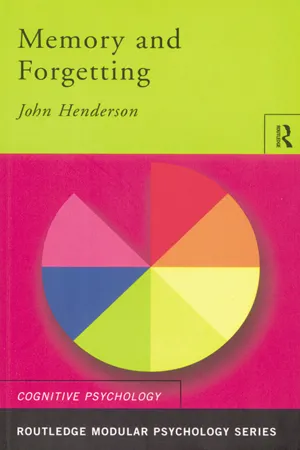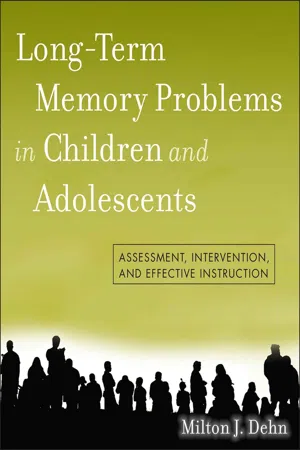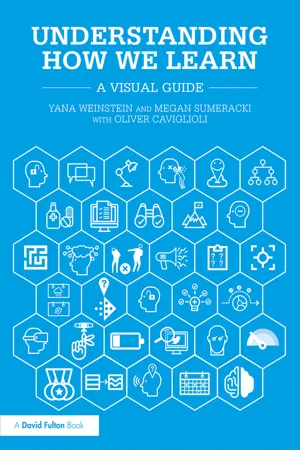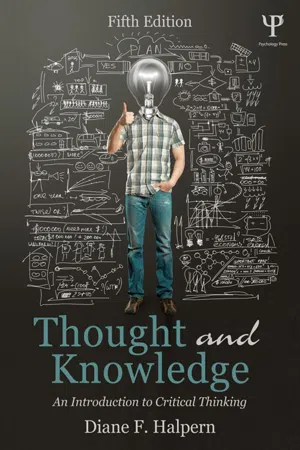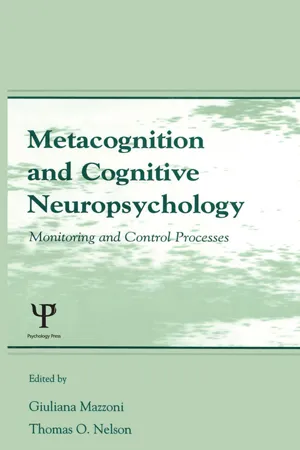Constructive Processes in Memory
Constructive processes in memory refer to the ways in which our memories are influenced by our existing knowledge, beliefs, and expectations. These processes can lead to the reconstruction or distortion of memories, as well as the formation of false memories. They play a significant role in shaping our recollection of past events and experiences.
6 Key excerpts on "Constructive Processes in Memory"
- eBook - ePub
- John Henderson(Author)
- 2005(Publication Date)
- Routledge(Publisher)
...Part II The Structure and Processes of Human Memory Pure Aspects 2 How do we study memory? DOI: 10.4324/9780203977651-2 Approaches to the study of memory There is no doubting the fact that our ability to remember information is an integral part of our lives. Even when we are not striving to remember a particular event, a person’s name, a fact for an examination or whatever, our day-to-day lives rely on constantly referring to our past and linking it to our present and our future. Whilst simply engaging in a conversation with a friend, we are required to produce and comprehend language at high speeds. For this we must access words, ideas and experiences from our memories and shape them into a series of sentences using a structure and grammar that is also represented in our permanent memories. Yet we do all this so effortlessly! The processes involved in accessing memories happen in an instant, and usually without our conscious awareness of them. This makes the scientific study of such processes highly problematical. Under everyday conditions we can merely speculate about how memories really work, and this is a frustration that is shared by those who theorise in all areas of cognitive psychology—thinking, perception, language and attention. Over the years, however, cognitive psychologists have made the best of the situation. Typically, they have adopted one of three general approaches to study, although sometimes these approaches have overlapped. They are, however, discussed individually. Computer approaches A rapidly expanding area in which psychologists are developing expertise is called cognitive science. Various aspects of cognition can be modelled by computer systems. A researcher might have a theory about how a given area of human cognition works, and may then develop a computer program to mimic this. In formation-processing models are popular in this respect...
- eBook - ePub
Long-Term Memory Problems in Children and Adolescents
Assessment, Intervention, and Effective Instruction
- Milton J. Dehn(Author)
- 2010(Publication Date)
- Wiley(Publisher)
...Accordingly, prospective memory concerns and interventions will not be emphasized in this book. LONG-TERM MEMORY PROCESSES The long-term memory systems discussed earlier in this chapter are distinguished mainly by content or types of learning. In order for information to become a memory and remain accessible it must go through a series of cognitive processes. The big three processes are encoding, consolidation, and retrieval but several other processes and factors are also involved in the creation, duration, and recall of a memory. Encoding Encoding refers to the process of transforming sensory and perceptual information into a representational code that can be stored in long-term memory. Because encoding is a process of transformation, memories are coded records of experience, not exact replicas of the events or materials themselves. The records created by encoding are referred to as memory traces. Memory traces are not immutable because they are frequently updated and restructured during ongoing learning. Modifications also may occur during storage and retrieval processes. Encoding differs according to the type of sensory or processing system involved, as well as by the content. The form and extent of encoding is in part determined by the stimulus and in part determined by the individual’s interpretation of the event or material. Consequently, any given experience or piece of information can be encoded in multiple formats and multiple brain locations (Brown & Craik, 2000). For example, verbal information may be encoded in terms of its phonological features, or it could be coded in terms of its semantic characteristics. Also, multiple modality encoding may occur, such as when information is encoded in both an auditory and visual mode. Furthermore, information may be encoded with multiple memory representations...
- eBook - ePub
Understanding How We Learn
A Visual Guide
- Yana Weinstein, Megan Sumeracki, Oliver Caviglioli(Authors)
- 2018(Publication Date)
- Routledge(Publisher)
...For example, if your friend tells you something, you later might believe you heard it from your teacher, or another reliable source. Details from your imagination can become part of your memories. I (Megan) have a false or distorted memory of burning my hand when I was a child. It did happen, but I do not remember it accurately: I picture it in the house I grew up in and remember, whereas this actually happened in the house we lived in up until I was four, and I can’t remember that house at all. Even details from our dreams can make it into our memories of real-life events (Johnson, Kahan, & Raye, 1984). When I was 11, I (Yana) once dreamed that my chamber music lesson was canceled, and didn’t bring my music to school that day because I had confused the dream with real life. I am not sure my teacher believed my excuse at the time. So, we have seen that recalling information in a reconstructive way can potentially introduce errors. On the other hand, understanding that memories are reconstructed each time we retrieve them is important as it underpins some of the strategies we discuss in Part 3 of the book. In particular, recalling information correctly actually strengthens memory (see Chapter 10). Memory consists of many different processes Aside from being reconstructive and subjective, memory is also not a unitary process. Instead, multiple processes are thought to make up the rich experience that we call memory. In a guest post on our blog, James Mannion (2016) discussed various dichotomies and distinctions that frequently come up in memory research, but here we focus on two that are particularly relevant to education. Multiple processes are thought to make up the rich experience that we call memory. Short-term vs. long-term memory Have you heard people referring to how they can never find stuff they’ve left around the house, and following this with “my short-term memory is really bad”? That would be a scientifically inaccurate use of that term...
- eBook - ePub
Thought and Knowledge
An Introduction to Critical Thinking
- Diane F. Halpern(Author)
- 2013(Publication Date)
- Psychology Press(Publisher)
...First, you could use them to improve memory by considering information that you want to remember by overlearning and spacing learning sessions over time. In addition, make the material to-be-learned familiar and prominent, generate encoding cues, use organizational strategies, and elaborate by connecting the new information to knowledge you have already acquired. Perhaps, even more importantly, you can be aware of the ways your memory is likely to be biased and engage in deliberate attempts to debias your recollections. Chapter Summary • Memory was described as the mediator of cognitive processes because all of our thoughts depend upon the ability to use what we have stored in memory. • Long-term memories are stored in associative networks, so remembering something automatically makes it more likely to remember related concepts. • Most people believe that memory is like a video camera that records and replays an accurate version of what happened, but in fact, memory is often inaccurate, even when people are highly confident that they are remembering accurately. We often miss even unusual events that occur “right before our eyes,” and we often believe information that seems familiar even when it is not true. • The “illusion of truth” refers to the memory phenomenon in which we forget the source and sometimes even the content of a message, but when we encounter the name of a person who was part of the forgotten message, the “feeling of familiarity” is interpreted as “the new message must be true.” This occurs without conscious awareness, so all we can do is be aware of the possibility that it is happening and be less willing to believe rumors or innuendos. • There are many different varieties of memory...
- eBook - ePub
Human Memory
Structures and Images
- Mary B. Howes(Author)
- 2006(Publication Date)
- SAGE Publications, Inc(Publisher)
...The external (nonmental) chair was labeled as the thing signified. It should be noted that in the present model all abstract content in a memory is constructed. Most memories contain a very large body of abstract content. This content is usually accurate, particularly at its higher, more critical, levels. Although a memory function that is constructive can (and does) lead to changes and alterations in recall, this is not the point or purpose of reconstructive memory. A memory function of this kind is capable of moving beyond perceptual imagery; and this is the source of its being so effective in dealing with the world. 4. Constructivism in Mainstream Psychology In an influential text, Neisser (1967) noted that it is incorrect to assume that memories are stored in LTM and later simply moved again into awareness (retrieved). Instead, at the time of recall the memory function uses some of the originally coded information but may also infer additional content (for instance,, to fill in gaps or weaknesses in the original codes). And critically, it is the reconstructed memory that is entered into awareness. This remains the cornerstone position of constructivism today. Chapter 9 introduces two models of how the relevant events may unfold. Constructivist ideas have found various forms of expression in the mainstream field. Work with neural network models has emphasized how information can naturally be inferred at the time of recall and how the state of the system, at recall, is necessarily different from the state of the system during encoding. The artificial neural networks of this tradition are based on the functioning of units, which might at first appear contrary in spirit to the notion of schemas, including higher-order schemas, which is fundamental to the constructivist tradition. McClelland and Rumelhart (1986, vol. 2, chap...
- eBook - ePub
Metacognition and Cognitive Neuropsychology
Monitoring and Control Processes
- Giuliana Mazzoni, Thomas O. Nelson(Authors)
- 2014(Publication Date)
- Psychology Press(Publisher)
...At the theoretical level, it calls for more serious efforts to incorporate monitoring and control processes—as well as encoding, storage, and retrieval processes—into our theories and models of memory. At the same time, however, an acknowledgment of the potential effects of metamemoiy processes on memory performance poses a troubling policy issue: How should such effects be handled when assessing memory performance? Incorporating Monitoring and Control Processes into the Assessment of Memory How have the effects of monitoring and control processes during memory reporting typically been treated in the evaluation of memory? In general, experimental psychologists have shied away from tackling the implications of subject-controlled processes in memory reporting, presumably because of the perceived conflict between the operation of these processes and the desire to maintain strict experimental control (see Nelson & Narens, 1994). Thus, one approach has been to take control away from the participant, for instance by using forced-report testing techniques (Erdelyi & Becker, 1974). Another alternative is to allow participants some degree of control, but then to attempt to "correct" for it by applying such techniques as those provided by the signal-detection methodology (Banks, 1970) or formula scoring (Budescu & Bar-Hillel, 1993). A third approach has been simply to ignore subject control altogether, assuming that it does not have much effect on performance anyway (see Roediger, Srinivas, & Waddil, 1989). None of these approaches, however, seems completely satisfactory. First and foremost, they are all designed primarily to circumvent the contribution of subject-controlled processes to memory performance, treating this contribution as a nuisance variable rather than an integral aspect of memory functioning that should be assessed and studied...
